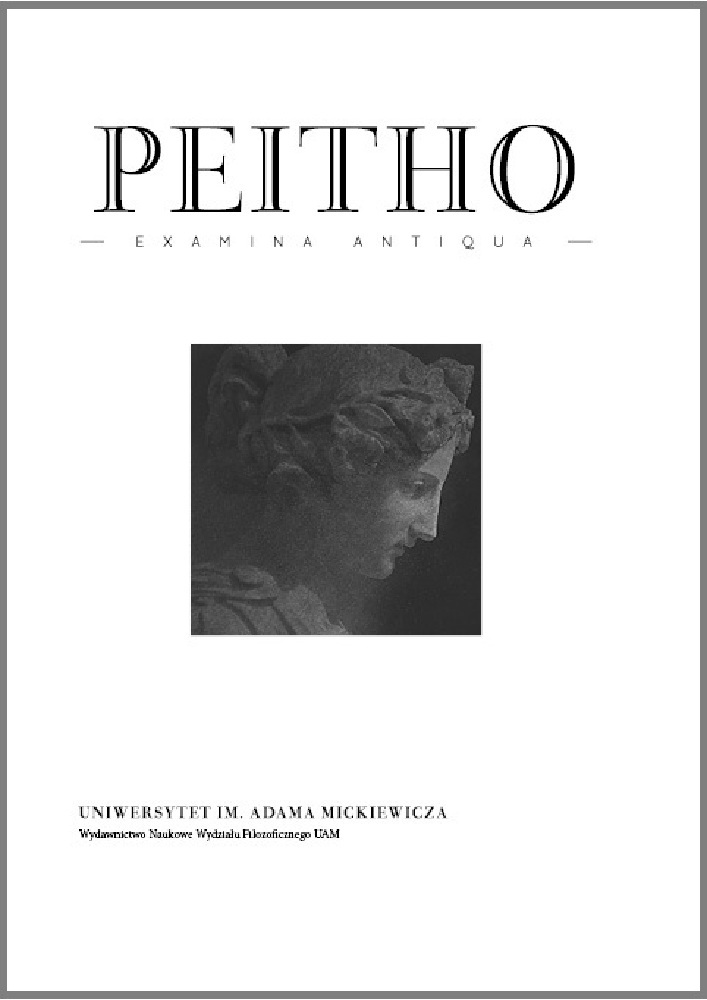Abstract
This paper presents Aristotle’s method of understanding the first principles of natural things in the Physics I.1 and analyzes the three stages of which this method consists. In the Physics I.1, Aristotle suggests that the natural proper route which one has to follow in order to find out the first principles of natural things is to proceed from what is clearer and more knowable to us to what is more knowable and clear by nature. In the Physics I.1, the terms καθόλου (universal) and καθ΄ ἕκαστα (particular) are not used in their usual meaning (e.g., the meaning which the same terms have in the Posterior Analytics I. 2). This paper examines the Physics I.1 in comparison with the Posterior Analytics II. 19 in order to elucidate the meaning of καθόλου in the first chapter of Aristotle’s Physics. Furthermore, it reaches the conclusion that the structure of the natural world to which we belong determines the structure and the form of our knowledge. On the one hand, natural things are composite and, on the other hand, perception is involved in the initial grasping of natural things as composites. Thus, since perceptual knowledge is more accessible to us than any other kind of knowledge it is natural to reach knowledge of simple things, i.e., of the principles, starting our inquiry with the composites.
Funding
Aristotle
method
natural things
principles
universal
particular
epagōgē
analysis
References
Angioni, L., 2001, “ Explanation and Definition in Physics I. 1”, Apeiron 34, pp. 307–320.
Barnes, J., 1975, “Aristotle’s Theory of Demonstration”, in: J. Barnes, M. Schofield, R. Sorabji (eds.), Articles on Aristotle, Vol. 1: Science, London, pp.65–87 [Phronesis 14 (1969), pp. 123–152] .
Barnes, J., 19942, Aristotle, Posterior Analytics, Translated with a Commentary, Oxford.
Bayer, G., 1997, “ Coming to Know Principles in Posterior Analytics II. 19”, Apeiron 30, pp. 109–142.
Bolton, R., 1991, “Aristotle’s Method in Natural Science: Physics I” , in: L. Judson (ed.), Aristotle’s Physics: a Collection of Essays, Oxford, pp. 1–29.
Charlton, W., 1992, Aristotle’s Physics, Books I and II, Translation with Introduction, Commentary, Oxford.
Eustratius, 1907, In Analyticorum Posteriorum II, CAG XXI 1, ed. M. Hayduck, Berlin.
Fritsche, J., 1986, Methode und Beweisziel im ersten Buch der „Physikvorlesung“ des Aristoteles, Frankfurt.
Horstschäfer, T. M., 1998, Eine Untersuchung zur methodischen und inhaltlichen Geschlossenheit des ersten Buches der Physik des Aristoteles, Berlin–New York.
Irwin, T. H., 1988, Aristotle’s First Principles, Oxford.
Kirwan, C., 19932 , Aristotle, Metaphysics, Books Γ, Δ, and E, Translated with Notes, Oxford.
Kullmann, W., 1975, “Zur wissenschaftlichen Methode des Aristoteles”, in:
G. A. Seeck (Hrsg.), Die Naturphilosophie des Aristoteles, Darmstadt, pp. 301–338.
Modrak, D. K.W., 1987, Aristotle, The Power of Perception, Chicago–London.
Osborne, C., 2006, Philoponus, On Aristotle Physics 1. 1–3, London.
Owen, G. E. L., 1986, “Τithenai ta phainomena” , in: M.C. Nussbaum (ed.), Logic, Science, and Dialectic: Collected Papers in Greek Philosophy, Ithaca, pp.239–251.
Philoponus, 1887, In Physicorum I–III, CAG XVI, ed. H. Vitelli, Berlin.
Philoponus, 1909, In Analytica Posteriora cum Anonymo, CAG XIII3, ed. M. Wallies, Berlin.
Pietsch, C., 1992, Prinzipienfindung bei Aristoteles, Stuttgart.
Ross, W.D., 1936, Aristotle’s Physics, A Revised Text with Introduction and Commentary, Oxford.
Seidl, H., 1995, Beiträge zu Aristoteles’ Naturphilosophie, Amsterdam–Atlanta.
Simplicius, 1882, In Physicorum I–IV, CAG IX, ed. H. Diels, Berlin.
Wagner, H.,1967, Aristoteles Physikvorlesung, Übersetztung, Darmstadt.
Waterfield, R., 1996, Aristotle, Physics, Translation, Introduction and Notes, Oxford.
Wieland, W., 1962, Die aristotelische Physik, Untersuchungen über die Grundlegung der Naturwissenschaft und die sprachlichen Bedingungen der Prinzipienforschung bei Aristoteles, Göttingen.
Wieland, W.,1975, “Aristotle’s Physics and the Problem of Inquiry into the Principles” in : J. Barnes, M. Schofield, R. Sorabji (eds.), Articles on Aristotle, Vol. 1: Science, London, pp. 127–140.
License
Peitho provides immediate open access to its content on the principle that making research freely available to the public supports a greater global exchange of knowledge.
